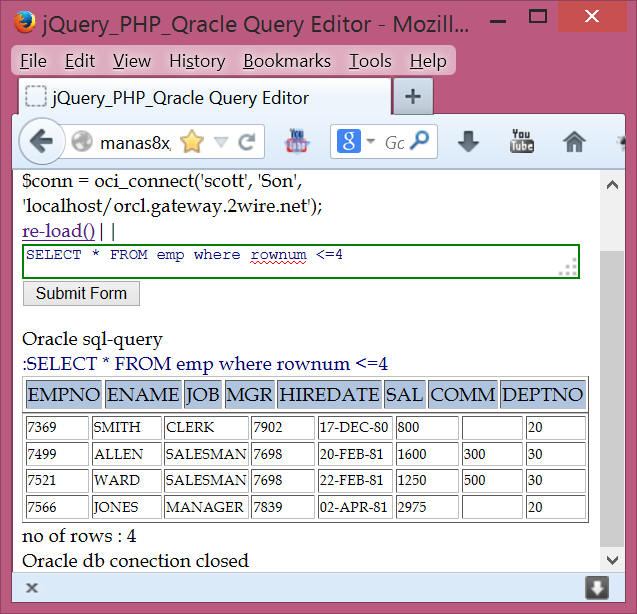Ref:
- Connect or Persistent connect: Persistent connections are cached and reused between requests.
- Parse: weight local preparatory steps before query execution.
- Bind: An optional step that allows the bindings of placeholder name to the variables/data values.
- Execute : Step that processes the statement and buffer any results. (** See notes below)
- Fetch: Gets query results from the database
- fetch_all: gets all results at once
- fetch_array(): gets the next row as an array (indexed with integers or BOTH)
- fetch_assoc(): gets the next row an associative array
(indexed with strings), example :
foreach($row as $item) { $item will print value of each row } - fetch_object(): fetch next row as an object
- fetch_row(): gets the next row of an indexed array
- Field: retrieves field informatio n
- Commit: committing a transaction
- error (oci_error())
- $e["code']: Oracle error number
- $e["message"]: Oracle error message
- $e{"offset"]: detect column position
- $e["sqltext"]: detect text of the sql statement
<?php
// connecting to db/Scott's account
$conn = oci_connect('scott', 'pwd', 'localhost/orcl.gateway.2wire.net');
//parsing and executing a statement
$stmt = oci_parse($conn, $sql);
oci_execute($stmt);
//printing data in table format.
echo "<table border='1'>\n";
while($row = oci_fetch_array($stmt, OCI_ASSOC+OCI_RETURN_NULLS)) {
echo "<tr>\n";
foreach ($row as $item) {
echo "<td class='td2'>".($item !== null ? htmlentities($item, ENT_QUOTES):" ")."</td>\n";
} //foreach ends
echo "</tr>\n";
}//while block ends
echo "</table>\n";
//freeing result set and closing db
oci_free_statement($stmt);
oci_close($conn);
?>
The htmlentities() function prevents any user data or operations like '<' to be interpreted as an HTML tag. In many cases you will want to use this function's optional ENT_QUOTES parameter. You should also use the optional character set parameter, specifying a value that matches the character set of your document.
Demo oputput

- OCI8’s default commit behavior is like other PHP extensions but
different from Oracle Database’s standard. The default mode of
oci_execute() is OCI_COMMIT_ON_SUCCESS to
commit changes. - Script: auto-commit with php
$stmt = oci_parse($conn, "insert intoTable1 values (7689,'SMITH')");
oci_execute($stmt); // automatically committed by default - Explicit No_autocommit
$stmt = oci_parse($conn, "insert into Table1 values (7689,'SMITH')"); -
oci_execute($stmt, OCI_NO_AUTO_COMMIT); // not committed (in practice it did commit) - In CREATE and DROP operations database assumes auto commit,
- With PDO:
you may use $dbh->commit();